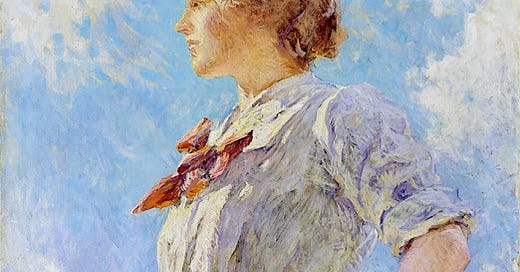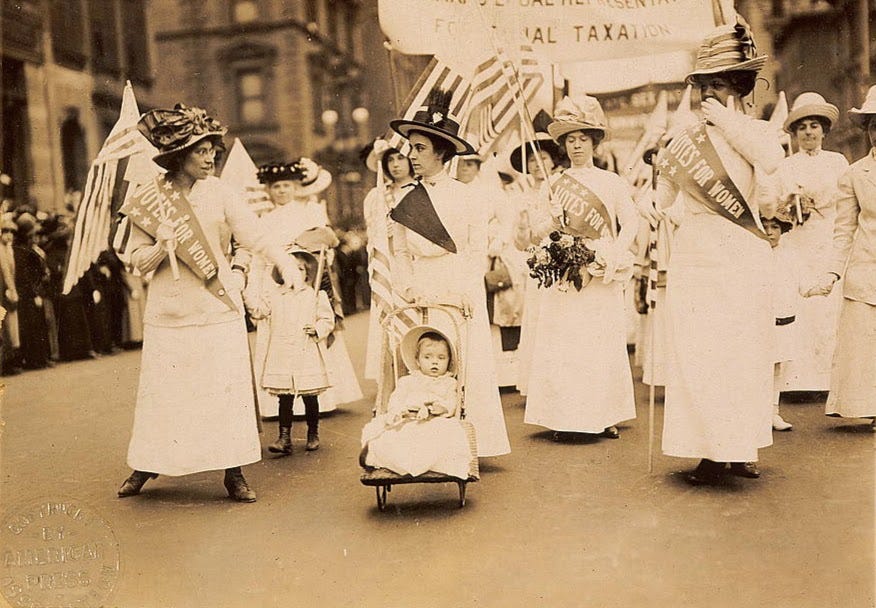Five Forgotten Feminist Novels
Including an unusual utopia, the OG girl boss, and some suffrage-based skullduggery
What Diantha Did by Charlotte Perkins Gilman (1910)
Charlotte Perkins Gilman’s The Yellow Wallpaper is a classic of feminist literature, with its spine-chilling indictment of the rest cure and what is surely the creepiest wallpaper found in any short story. Her novels, however, are less well-known. The eponymous heroine of What Diantha Did eschews her family’s (and society’s) expectations to forge her own career path. OK, her primary goal is to make enough money to marry her irritatingly patronising fiancé and finance his dodgy guinea pig experiments (what does she see in him?) but her success in growing a business empire, revolutionising housework and the ‘servant question’ in the process, makes for an enjoyably satisfying read.
“Of course I love him!” she said to herself aloud but softly, remembering the baby, “And no doubt he loves me! I'm glad to be his wife! I'm glad to be a mother to his child! I'm glad I married him! But—this is not what he offered! And it's not what I undertook! He hasn't had to change his business!”
She marched up and down the scant space, and then stopped short and laughed drily, continuing her smothered soliloquy.
“'Do you love me?' they ask, and, 'I will make you happy!' they say; and you get married—and after that it's Housework!”
“They don't say, 'Will you be my Cook?' 'Will you be my Chamber maid?' 'Will you give up a good clean well-paid business that you love—that has big hope and power and beauty in it—and come and keep house for me?'”
New Amazonia: A Foretaste of the Future by Elizabeth Burgoyne Corbett (1889)
I’ll be honest - it’s not really a surprise that this one hasn’t lasted the test of time. Suffragist and women’s rights activist Elizabeth Burgoyne Corbett’s utopian vision is uncomfortably mingled with eugenics and xenophobia to the point where it’s quite difficult to read (although the total lack of plot doesn’t help). The narrator mysteriously awakes in New Amazonia, formerly known as Ireland (no, me neither), a land peopled by giant PE fanatics in tabards and culottes, who are all vegetarian and keep themselves young thanks to ‘nerve force’ extracted from animals. Exciting events totally fail to ensue, as she finds out all about how their society works, then wakes up back in her own time. Not exactly a page-turner, but worth a look as a curiosity.
“It is a woman,” I thought. “A goddess!” the masher declared, and for a time I could not feel sure that he was mistaken.
She was close upon seven feet in height, I am sure, and was of magnificent build. A magnified Venus, a glorified Hebe, a smiling Juno, were here all united in one perfect human being whose gait was the very poetry of motion.
She wore a very peculiar dress, I thought… A modification of the divided skirt came a little below the knee, the stockings and laced boots serving to heighten, instead of to hide, their owner’s beautiful symmetry of limb…
She was surprised to see us, that was quite apparent, but she evidently mistook our identity for awhile. “What strange children!” she exclaimed, in a rich, sonorous voice, which was bewitchingly musical. “Why are you here, and for what particular purpose are you masquerading in this extraordinary fashion?”
The Crowded Street by Winifred Holtby (1924)
I’m embarrassed to admit that I only discovered Winifred Holtby recently, and this is the first book of hers I’ve read - but it definitely won’t be the last. In The Crowded Street we follow Muriel through school, the Great War, and beyond, in the quiet and restrictive mileu of her Yorkshire village. Confined by her parents and a society that have only one expectation of her - that she will marry and raise a family - how does she find meaning in a life where that seems unlikely to happen? Muriel is, in some ways, a passive character whom life just happens to, and you might think a story where she essentially doesn’t do very much would be boring. But far from it. This book is funny and heartbreaking and I couldn’t put it down. Bonus fact - the character of Delia in the book is partly a portrait of Holtby’s great friend Vera Brittain, author of Testament of Youth.
"I certainly am not going to college, because my mother needs me at home. I am not unhappy here. Some of us have to stay at home. I have my duty too," she added stiffly.
Delia looked at her, a queer sidelong glance below her long lashes. Then she laughed a little. "And I am being properly called to order for pursuing my selfish ambitions while you are following the path of virtue?"
They had come to the Vicarage gate, and stood below the budding trees.
"Well, well," smiled Delia, "I hope that you will be happy. I suppose that it's no good arguing. But for goodness' sake stay with your eyes open. Remember, there's only one thing that counts for a girl in Marshington, and that is sex success. Turn and twist how you will, it comes to that in the end. The whole of this sort of life is arranged round that one thing. Of course it's an important thing, but it's not the only one. If that's what you are after, stay by all means, and play the game. But if you can't play it well, or if you really care for anything else, clear out, and go before it is too late."
The Sturdy Oak: a composite novel of American politics by fourteen American authors by various (1917)
Despite the desperately boring-sounding title this is a rollicking romp of a political satire featuring Machiavellian manouevring and underhanded shenanigans a-plenty. The plot centres around the fight for women’s suffrage during an election in Whitewater, upstate New York, and the personal and political upheavals caused when the unwary George Remington, newly married candidate for office, puts out a statement unequivocally disapproving of universal suffrage. With every chapter written by a different novelist, you might think this would make for a very uneven book, but it’s actually very readable (incidentally, I’d love to know whether they hashed out the storyline together, or took it in turns to write a chapter each, like a game of Consequences.)
Now, it's all very well to talk about two hearts beating as one, and in the accepted poetical sense of the words, of course Genevieve's and George's did. But as a matter of physiological fact, they didn't. At the end of twenty minutes or so George began turning a delicate blue and a clatter as of distant castanets provided an obligato when he spoke, the same being performed by George's teeth.
The person who made these observations was Betty.
"You'd better go out," she said. "You're freezing."
It ought to have been Genevieve who said it, of course, though the fact that she was under water more than half the time might be advanced as her excuse for failing to say it. But who could venture to excuse the downright callous way in which she exclaimed, "Already? Why we've just got in! Come along and dive through that wave. That'll warm you up!"
It was plain to George that she didn't care whether he was cold or not. And, though the idea wouldn't quite go into words, it was also clear to him that an ideal wife—a really womanly wife—would have turned blue just a little before he began to.
The Home-Maker by Dorothy Canfield Fisher (1924)
Like Charlotte Perkins Gilman, Dorothy Canfield Fisher would probably have described herself as a humanist rather than a feminist - but this role-swapping novel is a brilliant indictment of a society that insists a woman’s place is in the home. Fisher’s interest in child development (she was an early proponent of Maria Montessori’s methods) comes to the fore in this story of frustrated housewife Evangeline, whose energy and brains are ill-suited to child-rearing and domesticity; gentle, dreamy Lester, her husband, whose love of literature and undemanding personality clash with his office job; and their three children, who are all suffering in their own ways. But after a serious accident upends the family order, their lives - both outer and inner - are profoundly changed. This novel always makes me cry, as well as feeling incredibly grateful that things have moved on somewhat in the last hundred years.
“That’ll do for to-day, Mrs. Knapp,” he said with dignity. “I’m glad to hear you like the work. You seem to be giving very good satisfaction. We ... we ...” he hesitated, wondering just how to phrase it. “We have been meaning to add one more salesperson to the Cloak-and-Suits, to see if the department would carry one more. If you like, we will try you out there, beginning with next week. The pay is no higher. But of course you get a bonus on all sales after your weekly quota is reached.”
“Thank you very much, Mr. Willing,” she said, with some dignity of her own, the dignity of a mature woman who knows that she is useful.
He liked her for her reserve. She turned away.
He called after her, as though it were a casual notion, just come into his head, “Are you anything of a reader? Would you be interested in looking at a manual on retail selling? I have a pretty good one here that gives most of the general principles. Though of course nothing takes the place of experience.”
Her reserve vanished in a flash. Her strongly marked, mature face glowed like a girl’s. She came swiftly back towards him, her hand outstretched, “Oh, are there books written about the business?” she cried eagerly. “Things you can study and learn?”
Please click the heart if you enjoyed this piece!
Are there any other books you’d add to this list? Let me know what you think! I appreciate and reply to every comment.










This is a great selection of novels I wasn't familiar with, but should be, Harriet! Thank you. I'm adding them to my list. I am especially keen to read Holtby's The Crowded Street, which sounds wonderful. In my post on Eileen Power I mention how, in Testament of Friendship (1940) Vera Brittain describes how, when she and Winifred Holtby were preparing to give up their flat in Doughty Street to move to the suburbs in the 1930s, one horrified friend asked them, ‘Why are you leaving the neighbourhood of Tawney and Eileen Power for a place called Maida Vale?'
https://akennedysmith.substack.com/p/women-at-cambridge-eileen-power
The Homemaker is one of my all time favourite books. I have read Herland by Gilman but not heard of What Dianathe did. Holtby is on my tbr list; like an earlier responder I have read lots of Britain's fiction but failed to read Holtby. No idea why. The other two were completely new to me. Thanks for sharing